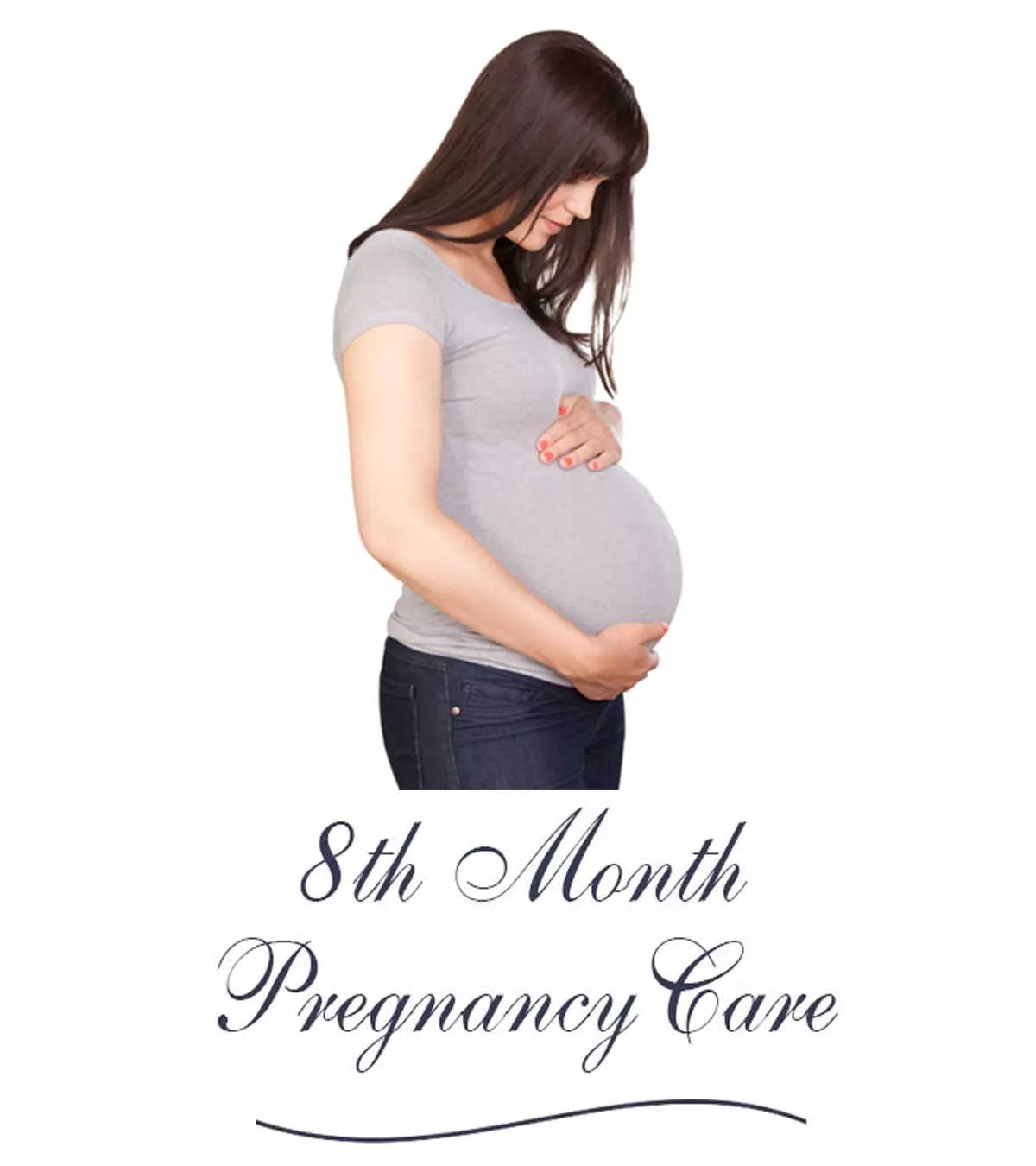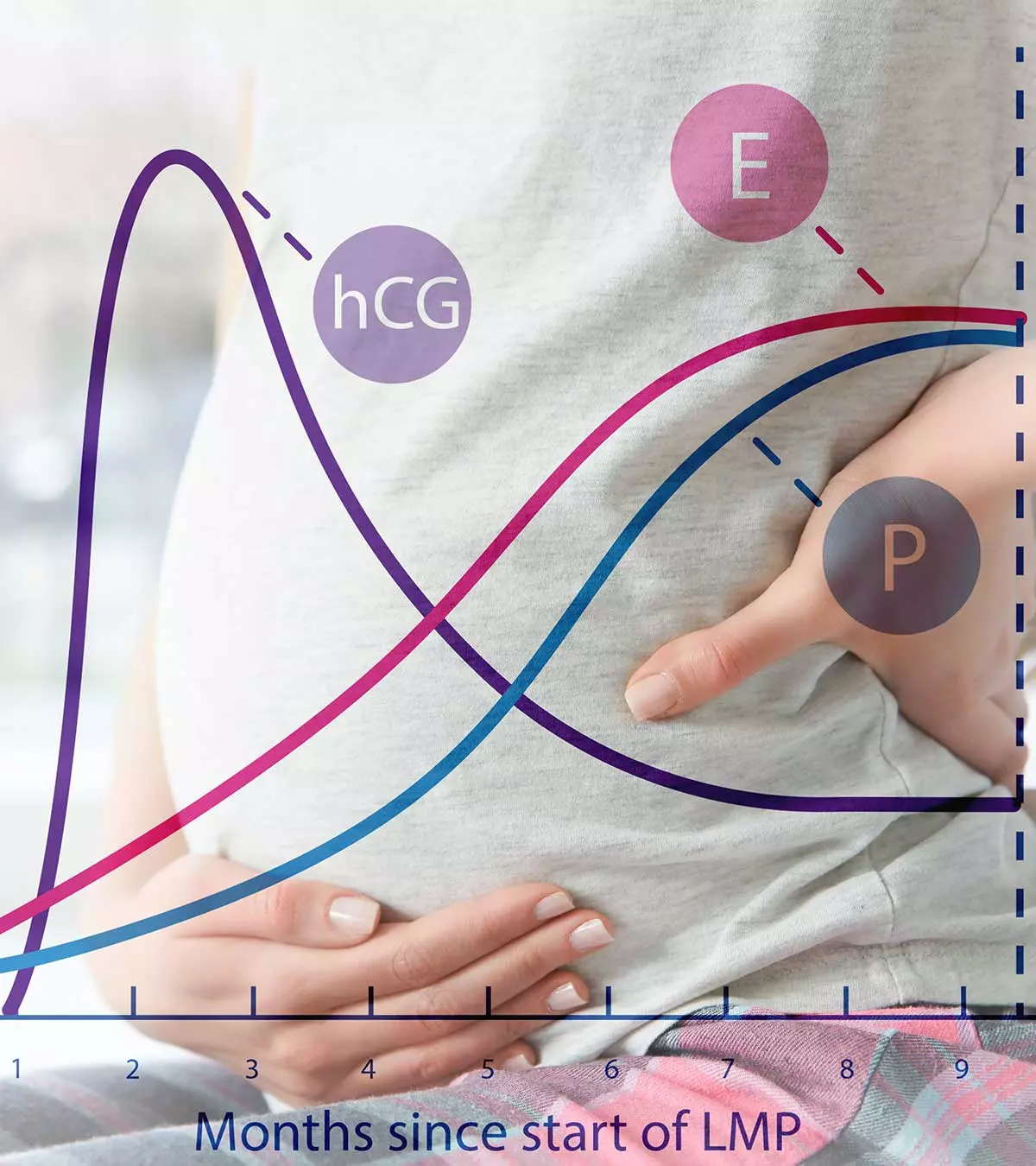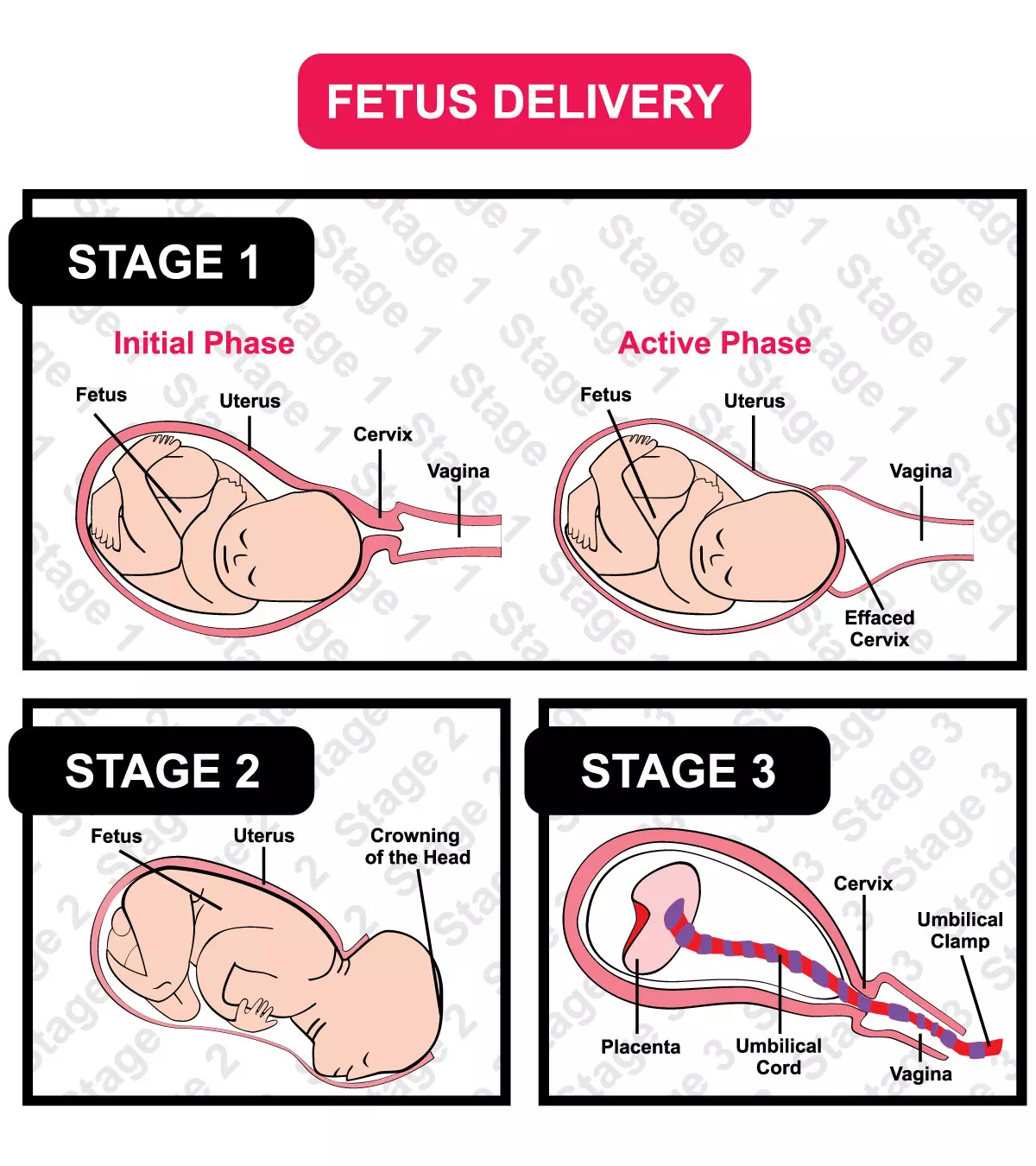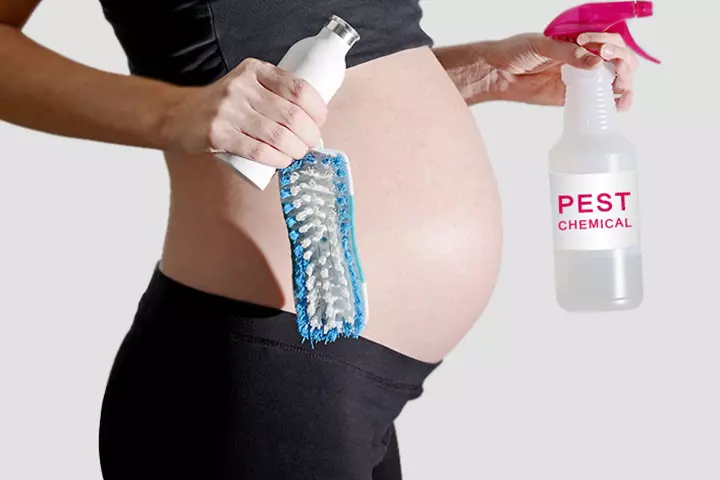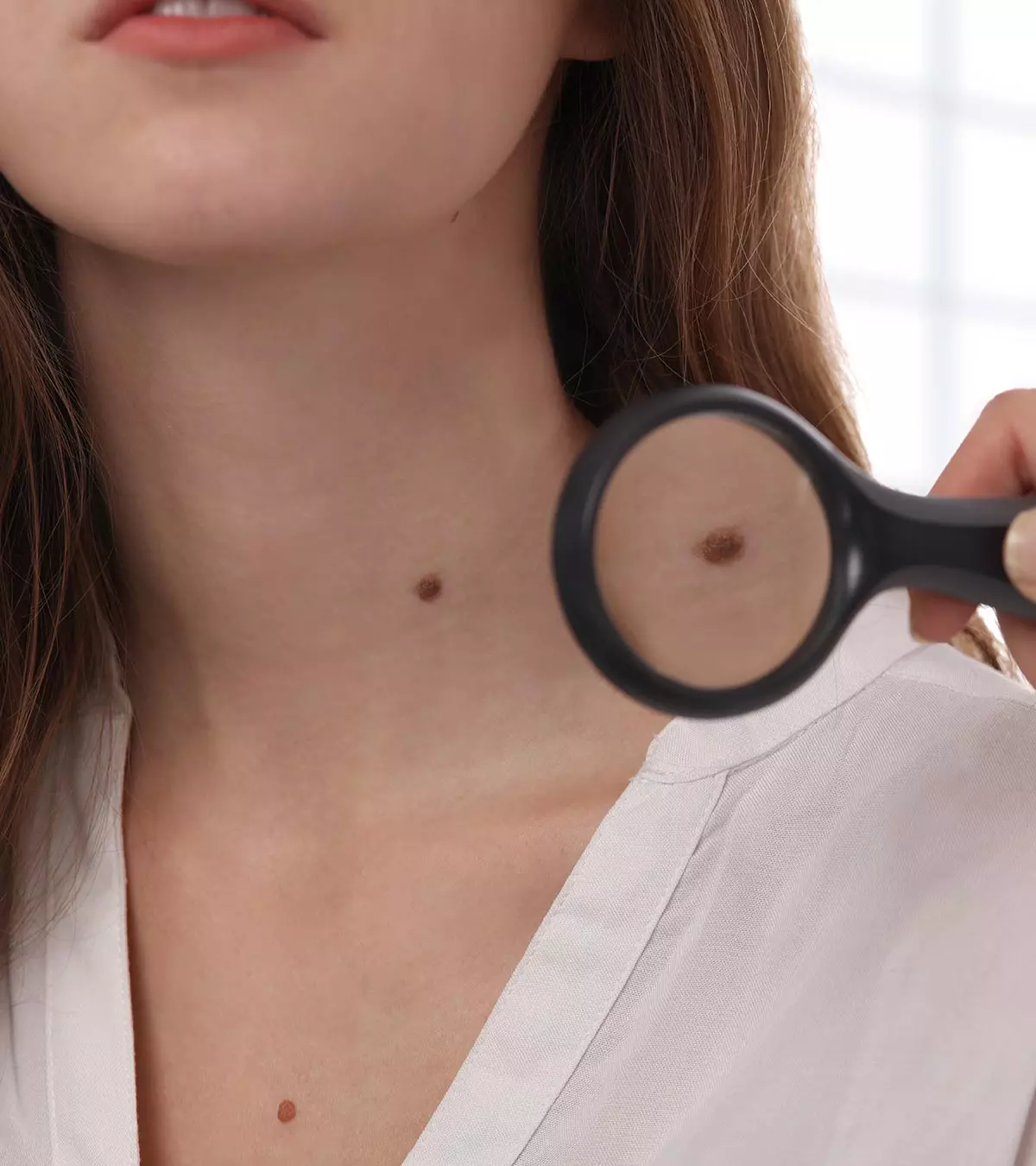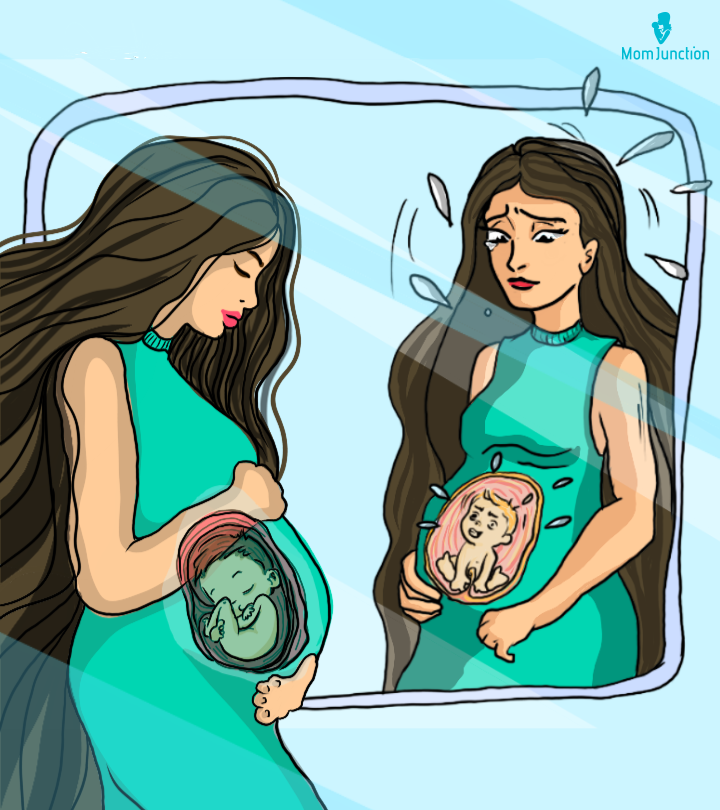
Image: ShutterStock
Fetal hiccups are normal during pregnancy. However, you may be surprised, confused, or even scared if it is your first time carrying a baby. As the baby grows inside, you will experience several movements such as kicks, rolls, and jabs that become stronger each day. Fetal hiccups are similar movements that are usually not a cause of concern.

Continue reading this post as we explain fetal hiccups, how to ease them, and when to see a doctor.
Key Pointers
- Fetal hiccups are a normal aspect of fetal development induced by diaphragmatic contractions caused by the baby breathing amniotic fluid.
- Hiccups are distinguished from baby kicks by their rhythmic motions from a single area of the abdomen.
- Fetal hiccups begin at about 9 weeks of pregnancy and become more intense in the third trimester.
- They are an indication of normal reflex and respiratory development.
- If the mother notices an increase in hiccups, she should see a doctor.
What Are Fetal Hiccups?
Baby hiccups in the womb are little movements the diaphragm makes when the baby begins to practice breathing. When the baby inhales, the amniotic fluidiA transparent, light yellow fluid that protects the fetus from harm enters into the lungs causing the diaphragm to contract, resulting in hiccups (1). They are a normal part of embryonic development and rarely indicate a problem with the umbilical cord or maternal health.
Consultant pediatrician Dr. Raashid Hamid says, “Fetal hiccups and breathing are observed mainly during active periods rather than quiet ones. Research highlights the developmental differences between the two, with hiccups being more common in early gestation and fetal breathing becoming more pronounced as the fetus matures.”
Brooklyn-based board-certified pediatrician Dr. Edward Kulich says, “Fetal hiccups are commonly observed in the womb. They are normal reflexive movements and also a sign of the baby practicing to breathe. If they last for more than a few minutes or occur more frequently, they should be evaluated by your doctor.”
 Research says
Research saysWhat Does It Feel Like When Your Baby Gets Hiccups In The Womb?
Fetal hiccups feel like repetitive taps or kicks from the baby, which you will experience once or many times a day.
They are a series of little rhythmic or jerky movements that show a positive sign of the baby being healthy and active. However, not all women feel baby hiccups, but still, deliver healthy babies (2).
Kourtney Nichole, a mom and blogger, shares her 34-week pregnancy experience. She says, “I love talking about my pregnancy. I love how warm I feel when I tell people how I can feel her little hiccups beneath my belly button or when she hears her father’s voice and starts kicking. It’s almost like she knows it’s him. I love going through this amazing time and sharing it with those around me (i).”
 Quick fact
Quick factWhy Do Babies Get Hiccups In The Womb?
Fetal hiccups show signs of prenatal development in the womb. The reasons behind the occurrence of baby hiccups are as follows (3) (4):
- Contractions in the diaphragm are the major contributing factors for baby hiccups in the womb. As the fetus sucks in the amniotic fluid, the diaphragm contracts leading to a hiccup effect. David A Kaufman, MD, a neonatologistiA health professional specialized in providing care for newborns from Charlottesville, Virginia, says, “As the placentaiA temporary organ formed in pregnancy that clings to the uterus and supplies the developing fetus with nutrients and oxygen is doing the breathing (oxygen and carbon dioxide exchange) for the baby, the fetal breathing occurs about six times per minute and is important for lung development.
“Since fetal breathing is due to the contraction of the diaphragm and rib muscles, the baby can have hiccups. These are the same as a hiccup in any infant, child, or adult: a more forceful, rhythmic, and involuntary contraction of the diaphragm!” - Development of reflexes, where the fetus is trying to suck fingers or thumb may also result in hiccups.
- Brain finds it necessary to practice reflux when swallowing food or expelling wastes that might also lead to fetal hiccups. It is a healthy process by which it strengthens the heart muscles and respiration.
- Fetal blood flow disturbances and cord compression could also cause hiccups when the umbilical cord winds along the fetal neck, limiting the oxygen flow (5).
When Are Fetal Hiccups Common?
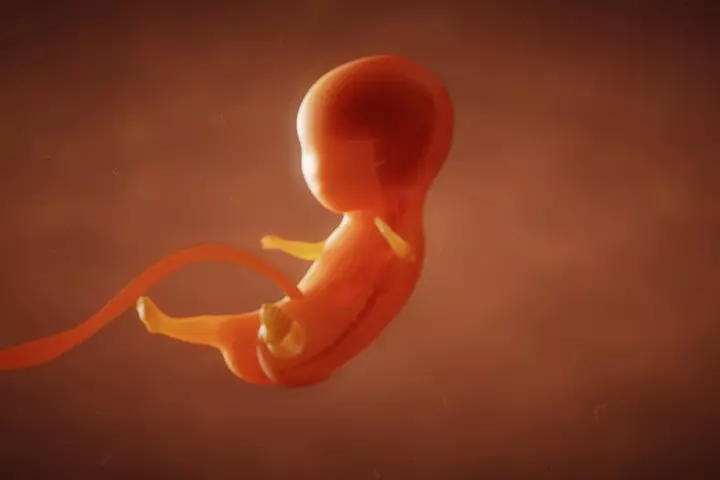
You will feel the hiccups at the end of the second trimester. They become stronger in the third trimester. This is usually after nine weeks of pregnancy when the arms and legs start developing (6). Hiccups will not be felt with the same intensity as the pregnancy progresses, and their frequency tends to reduce as you get closer to labor.
If hiccups aggravate during three to four weeks nearing the due date, it could be an umbilical cordiIt is a tube-like structure that connects the fetus to the placenta and allows the flow of oxygen and nutrients issue that needs doctor’s attention.
How To Ease The Baby’s Hiccups?
Although baby hiccups are perfectly normal, they could be annoying sometimes. They may even distract you or disturb you, preventing uninterrupted sleep. The following measures can help to tackle the discomfort.
- Take a walk when you feel the rhythmic movements of the hiccups. It will shift the baby’s position and relax the diaphragm. This could even make the baby sleep.
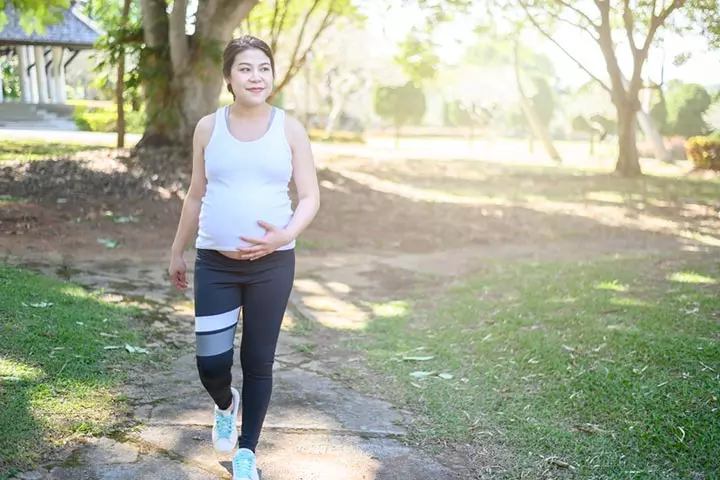
- Have more water as hiccups could also develop when you are low on fluid levels.
- Consume a light snack or meal containing protein. It helps your body relax and helps your baby sleep.

- Do not hold your breath to get rid of hiccups, as it could be dangerous for the baby.
 Quick tip
Quick tipRemember, these are only tips but not sure-shot ways that stop the fetal hiccups. The hiccups subside by themselves and are a normal part of a baby’s development.
Is It Hiccups Or Your Baby Kicking?
It is possible to differentiate between the hiccups and the baby’s kicks during pregnancy. In some cases, your baby will move if they are uncomfortable in the same position, or when you eat something cold or hot. If you feel these movements in different parts of your tummy, and if they stop if you change your position. These are likely to be kicks.
But if you are completely still and feel rhythmic twitches from only one part of your tummy, they are likely to be fetal hiccups. It may take you a while to understand and identify these movements (7).
Tracy, a mother and blogger, shares her experience of distinguishing between baby movements and hiccups, saying, “I have clearly felt baby hiccups a handful of times, more often at night and once recently at work. Rhythmic and tiny, gloriously predictable from one to the next. I know they don’t last long (for us at least) so I keep my hand on my belly to enjoy the moment and feel them. In total, they usually last less than a minute, but in those seconds, I can relax (ii).”
The occurrence and sensation of fetal hiccups and movements can vary among women and cannot be generalized. If you notice any unusual changes in your baby’s movements, it is advisable to consult a healthcare professional.
When Should You See A Doctor?

Hiccups generally aren’t a cause for concern. However, post 32 weeks, you are less likely to feel fetal hiccups daily (8). Still, if you experience a sudden increase in hiccups that last longer (more than 20 minutes) or become more intense, contact an obstetrician/gynecologist. An ultrasound will help the doctor understand the condition of the baby. This is also why you must pay attention to the baby’s movements.
Next, we answer some queries raised by our readers.
Frequently Asked Questions
1. Are fetal hiccups a sign of labor?
No, fetal hiccups are not a sign of impending or preterm labor. Their frequency usually decreases with the nearing due date.
2. How long do fetal hiccups usually last?
Fetal hiccups usually last a few seconds or minutes. If they continue for more than 15 minutes, it could be a cause of concern, and you should see a doctor (8).
3. Is it normal to have fetal hiccups for more than 20 minutes?
Yes, sometimes fetal hiccups may continue for 20 minutes or more. This condition needs a doctor’s attention, and the baby may be evaluated for reflux.
4. Do fetal seizures feel like hiccups?
Periodic fetal movements that are forceful, abnormal, and jerky are fetal seizures. Whereas fetal hiccups feel like repetitive taps from the baby (11).
5. Do fetal hiccups impact fetal heart rate?
Yes. Research suggests that fetal hiccups are linked to increased fetal heart rate, staying consistent until the 36th week of pregnancy. After 36 weeks, the heart rate starts to decrease (13).
Fetal hiccups are unrhythmic jerking motions or pulsating jumps that may move your belly during the gestation period. They could be caused by the contraction of the fetal diaphragm and the beginning of some developmental reflexes. These movements are more evident at the end of the second and third trimesters but are not a sign of labor. Taking a walk, drinking water, and consuming a light protein-rich snack may help ease the hiccups. Though they are normal in most cases, you may seek medical care to ensure the baby’s well-being if you experience continuous and persistent fetal hiccups.
Infographic: How To Prevent Fetal Hiccups In Utero?
Fetuses can be seen hiccuping, especially on ultrasounds. But, they can be felt in the mother’s belly too. Sometimes the hiccups continue without reason causing discomfort for the mother. This infographic helps you understand some strategies that could help you prevent baby hiccups in the womb.
Some thing wrong with infographic shortcode. please verify shortcode syntax
If you want to know whether fetal hiccups are a good sign during pregnancy then find out what experts say in this informative video. Learn the importance of fetal hiccups and how they can be a sign of a healthy pregnancy.
Personal Experience: Source
MomJunction articles include first-hand experiences to provide you with better insights through real-life narratives. Here are the sources of personal accounts referenced in this article.
i. Trying to find self-gratitude during pregnancy;
https://medium.com/@Kourtneynichole/trying-to-find-self-gratitude-during-pregnancy-391b0efac6fb
ii. Tracy’s Bump Day Blog, Week 34: Baby Hiccups;
https://pregnancyafterlosssupport.org/tracys-bump-day-blog-week-34-baby-hiccups/
References:
1. Mary Pillai & David James; Hiccups and breathing in human fetuses; Archives of Disease in Childhood (1990)
2. Pregnancy—your baby’s movements and what they mean; ANZSA
3. Elisabet O. Orville; Fetus to Newborn: The Perinatal Period; Yale-New Haven Teachers Institute (2018)
4. Midwivesonline.com; Ask a Midwife; page 101
5. Jason H Collins; Umbilical cord accidents; BMC Pregnancy and Childbirth (2012)
6. E.E. van Woerden et al.; Fetal hiccups; characteristics and relation to fetal heart rate; European Journal of Obstetrics & Gynecology and Reproductive Biology (1989)
7. Robyn Horsager-Boehrer; Feeling your baby move during pregnancy; UT Southwestern (2018)
8. What are Fetal Hiccups?; Project Alive And Kicking
9. Fetal hiccups won’t harm your baby – they’re totally normal!; UT Southwestern (2025)
10. Best Sleeping Positions During Pregnancy; American Pregnancy Association
11. Eui Jung et al.; Prenatal Diagnosis of Fetal Seizure: A Case Report; PubMed
12. M. La Verde et al.; Objective and quantitative evaluation of fetal hiccups by computerized cardiotocography: a prospective observational study; Italian Journal of Gynecology & Obstetrics (2025)
13. Frank Witter et al.; The relationship between hiccups and heart rate in the fetus; The Journal of Maternal-Fetal & Neonatal Medicine (2006)
Community Experiences
Join the conversation and become a part of our nurturing community! Share your stories, experiences, and insights to connect with fellow parents.
Read full bio of Dr. Anita Gupta
- Dr. Raashid Hamid is a consultant in the department of Pediatric Surgery at GMC hospital and associate professor of Pediatric and Neonatal Surgery at SKIMS, Jammu & Kashmir, India. He has four years of experience and specializes in general surgeries, including appendectomy, cholecystectomy, and exploratory laparotomy.
 Dr. Raashid Hamid is a consultant in the department of Pediatric Surgery at GMC hospital and associate professor of Pediatric and Neonatal Surgery at SKIMS, Jammu & Kashmir, India. He has four years of experience and specializes in general surgeries, including appendectomy, cholecystectomy, and exploratory laparotomy.
Dr. Raashid Hamid is a consultant in the department of Pediatric Surgery at GMC hospital and associate professor of Pediatric and Neonatal Surgery at SKIMS, Jammu & Kashmir, India. He has four years of experience and specializes in general surgeries, including appendectomy, cholecystectomy, and exploratory laparotomy. - Dr. Edward Kulich is a board-certified pediatrician, a fellow of the American Academy of Pediatrics, and the American Academy of Home Care Physicians. He obtained his Doctor of Medicine from St. George's University School of Medicine, completed a residency in Pediatrics at Maimonides Medical Center, Infants and Children’s Hospital of Brooklyn, and maintains privileges at Cornell, Lenox Hill, Mt. Sinai, and NYU hospitals. He has over 15 years of experience and is the current president of the American Academy of Concierge Pediatricians. Dr. Kulich is the author of The Best Baby Sleep Book and The Best OLSAT Book.
 Dr. Edward Kulich is a board-certified pediatrician, a fellow of the American Academy of Pediatrics, and the American Academy of Home Care Physicians. He obtained his Doctor of Medicine from St. George's University School of Medicine, completed a residency in Pediatrics at Maimonides Medical Center, Infants and Children’s Hospital of Brooklyn, and maintains privileges at Cornell, Lenox Hill, Mt. Sinai, and NYU hospitals. He has over 15 years of experience and is the current president of the American Academy of Concierge Pediatricians. Dr. Kulich is the author of The Best Baby Sleep Book and The Best OLSAT Book.
Dr. Edward Kulich is a board-certified pediatrician, a fellow of the American Academy of Pediatrics, and the American Academy of Home Care Physicians. He obtained his Doctor of Medicine from St. George's University School of Medicine, completed a residency in Pediatrics at Maimonides Medical Center, Infants and Children’s Hospital of Brooklyn, and maintains privileges at Cornell, Lenox Hill, Mt. Sinai, and NYU hospitals. He has over 15 years of experience and is the current president of the American Academy of Concierge Pediatricians. Dr. Kulich is the author of The Best Baby Sleep Book and The Best OLSAT Book. - Dr. David A Kaufman is a pediatrics professor in the neonatology division. He has been teaching at the University of Virginia since 1999. Dr. Kaufman earned his medical degree from the University of Pittsburgh and did his residency in pediatrics at Albert Einstein Medical Center and a fellowship in neonatal-perinatal medicine at the Children’s Hospital of Philadelphia.
 Dr. David A Kaufman is a pediatrics professor in the neonatology division. He has been teaching at the University of Virginia since 1999. Dr. Kaufman earned his medical degree from the University of Pittsburgh and did his residency in pediatrics at Albert Einstein Medical Center and a fellowship in neonatal-perinatal medicine at the Children’s Hospital of Philadelphia.
Dr. David A Kaufman is a pediatrics professor in the neonatology division. He has been teaching at the University of Virginia since 1999. Dr. Kaufman earned his medical degree from the University of Pittsburgh and did his residency in pediatrics at Albert Einstein Medical Center and a fellowship in neonatal-perinatal medicine at the Children’s Hospital of Philadelphia.
Read full bio of Rebecca Malachi
Read full bio of Swati Patwal
Read full bio of Aneesha Amonz







